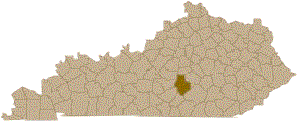|
The Adair County News,
April 18, 1906
An Old Tragedy Recalled
The following from the Hustonville [Lincoln Co.] correspondent to the
Danville Advocate will interest
many of our readers over in Casey, and along the boundary line:
There died a few days ago on the Rolling Fork, in Casey, and aged man,
Thos. Evans, whose death recalls one of the fiercest and bloodiest
tragedies ever witnessed on the streets of Liberty. On that day Bell and
McGoffin, candidates for Governor, had an appointment to speak in the
town. This was in the Spring or early Summer of 1860. The voting
population of the county assembled as well as great numbers from this
county, among them Bill Owsley, who had moved to a fine farm near here a
few years previous, from Lancaster.
Owsley was a bad man in liquor and would fight his weight in wild cats
when insulted. On this day red liquor was much in evidence in Casey's
Capitol. A difficulty sprang up between Owsley and Granville Johnson
which ended by Owsley drawing his trusty Colts and killing him in his
tracks.
Evans, the subject of this sketch, and a brother-in-law of Johnson,
sprang at Owsley with a knife and he was shot down: one hip broken.
Pandemonium reigned after this shot. Val and Tuck Peyton, neighbors and
kinsmen of Evans and Johnson, then engaged Owsley, who menaced him. Tuck
Peyton was soon disabled, but Val, a man of courage and wonderful
physique, went at Owsley with a Barlow knife, his only weapon.
It only required a few minutes for him to finish the fight. Owsley was
literally hacked to pieces and was carried into a room of the Napier
Hotel, where he lay for weeks before he could be brought home. In due
time Evans recovered, entered the Union Army under Col. Wolford, was
severely wounded and was discharged.
Tuck Peyton likewise joined the same command, was shot in the neck in
the battle of Mill Springs early in the war, and was brought home
paralyzed, but lived about forty years afterwards a mental and physical
wreck. During all these years he drew a pension of seventy-five dollars
per month.
Owsley sold his farm here, moved back to Lancaster and afterwards joined
the Confederate army, dying soon after the close of the war. |

